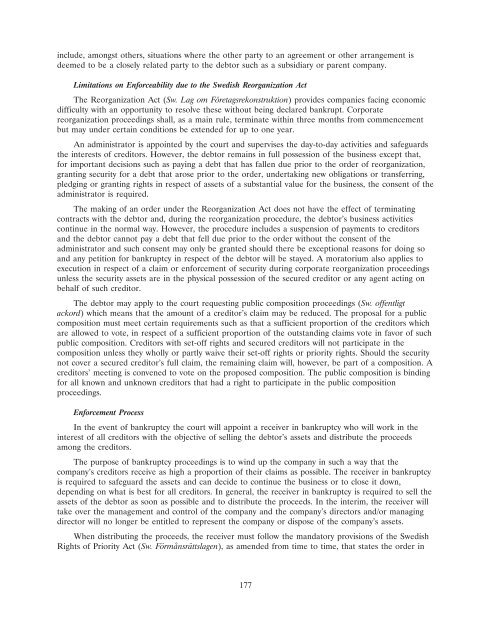Ardagh Glass Finance plc - Irish Stock Exchange
Ardagh Glass Finance plc - Irish Stock Exchange
Ardagh Glass Finance plc - Irish Stock Exchange
Create successful ePaper yourself
Turn your PDF publications into a flip-book with our unique Google optimized e-Paper software.
include, amongst others, situations where the other party to an agreement or other arrangement is<br />
deemed to be a closely related party to the debtor such as a subsidiary or parent company.<br />
Limitations on Enforceability due to the Swedish Reorganization Act<br />
The Reorganization Act (Sw. Lag om Företagsrekonstruktion) provides companies facing economic<br />
difficulty with an opportunity to resolve these without being declared bankrupt. Corporate<br />
reorganization proceedings shall, as a main rule, terminate within three months from commencement<br />
but may under certain conditions be extended for up to one year.<br />
An administrator is appointed by the court and supervises the day-to-day activities and safeguards<br />
the interests of creditors. However, the debtor remains in full possession of the business except that,<br />
for important decisions such as paying a debt that has fallen due prior to the order of reorganization,<br />
granting security for a debt that arose prior to the order, undertaking new obligations or transferring,<br />
pledging or granting rights in respect of assets of a substantial value for the business, the consent of the<br />
administrator is required.<br />
The making of an order under the Reorganization Act does not have the effect of terminating<br />
contracts with the debtor and, during the reorganization procedure, the debtor’s business activities<br />
continue in the normal way. However, the procedure includes a suspension of payments to creditors<br />
and the debtor cannot pay a debt that fell due prior to the order without the consent of the<br />
administrator and such consent may only be granted should there be exceptional reasons for doing so<br />
and any petition for bankruptcy in respect of the debtor will be stayed. A moratorium also applies to<br />
execution in respect of a claim or enforcement of security during corporate reorganization proceedings<br />
unless the security assets are in the physical possession of the secured creditor or any agent acting on<br />
behalf of such creditor.<br />
The debtor may apply to the court requesting public composition proceedings (Sw. offentligt<br />
ackord) which means that the amount of a creditor’s claim may be reduced. The proposal for a public<br />
composition must meet certain requirements such as that a sufficient proportion of the creditors which<br />
are allowed to vote, in respect of a sufficient proportion of the outstanding claims vote in favor of such<br />
public composition. Creditors with set-off rights and secured creditors will not participate in the<br />
composition unless they wholly or partly waive their set-off rights or priority rights. Should the security<br />
not cover a secured creditor’s full claim, the remaining claim will, however, be part of a composition. A<br />
creditors’ meeting is convened to vote on the proposed composition. The public composition is binding<br />
for all known and unknown creditors that had a right to participate in the public composition<br />
proceedings.<br />
Enforcement Process<br />
In the event of bankruptcy the court will appoint a receiver in bankruptcy who will work in the<br />
interest of all creditors with the objective of selling the debtor’s assets and distribute the proceeds<br />
among the creditors.<br />
The purpose of bankruptcy proceedings is to wind up the company in such a way that the<br />
company’s creditors receive as high a proportion of their claims as possible. The receiver in bankruptcy<br />
is required to safeguard the assets and can decide to continue the business or to close it down,<br />
depending on what is best for all creditors. In general, the receiver in bankruptcy is required to sell the<br />
assets of the debtor as soon as possible and to distribute the proceeds. In the interim, the receiver will<br />
take over the management and control of the company and the company’s directors and/or managing<br />
director will no longer be entitled to represent the company or dispose of the company’s assets.<br />
When distributing the proceeds, the receiver must follow the mandatory provisions of the Swedish<br />
Rights of Priority Act (Sw. Förmånsrättslagen), as amended from time to time, that states the order in<br />
177
















